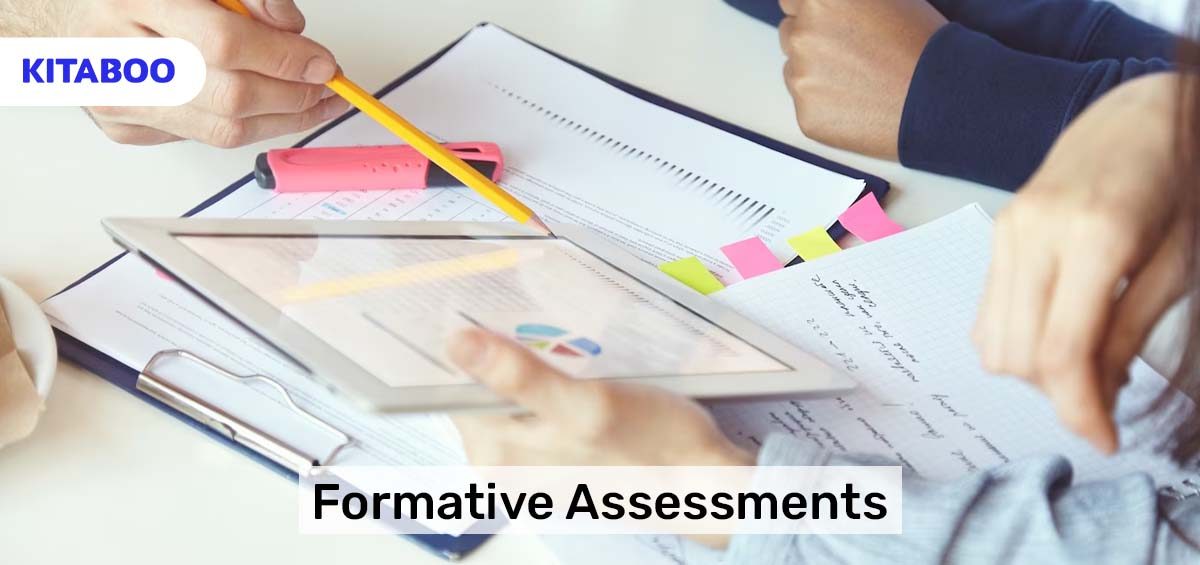We all know that evaluating students’ knowledge and tracking their performance is critical to enhancing their learning capacity. For this reason, assessments have always been a vital part of academics.
But are end-of-the-term examinations or summative assessments enough to evaluate students’ learning and proficiency? No! A lack of timely intervention by teachers and inadequate preparation cause students to lose focus and perform poorly in their assessments.
Here’s when formative assessments come into play. These assessments help instructors discover what students know while they’re still in the learning process. Let’s dig deeper into this ongoing assessment technique that can help you identify learning gaps along the way and close them.
Table of Contents
I. What are Formative Assessments?
II. Why Should You Conduct Formative Assessments?
III. 5 Principles to Form an Effective Formative Assessment Strategy
- Define Criteria for Good Performance
- Encourage Self-Assessment
- Provide Actionable Feedback
- Help Close the Learning Gaps
- Gather Information to Shape Teaching
IV. 4 Quick, Smart Methods to Conduct Formative Assessments
V. Wrapping Up
What are Formative Assessments?
Formative assessments are different techniques instructors adopt to conduct in-process evaluations of students’ understanding and academic progress during a lesson. They help teachers identify difficulties faced by students during the class and areas of improvement.
This way, it’s easier to adjust instructional techniques, lessons, and academic support. Continuous evaluation aims to collect detailed information that can help improve teaching and student learning while it’s occurring.
Generally, formative assessments are not graded, as the aim is to get a basic read on students’ progress and determine teaching effectiveness. These assessments may include students assessing peers, themselves, or even the teacher through conversation, quizzes, writing, and more.
With online platforms like KITABOO, instructors can now create interactive and engaging formative assessments quickly and hassle-free.
Why Should You Conduct Formative Assessments?
- Formative assessments help bolster students’ abilities to take ownership of their learning. Educators can use formative assessment to refocus students on the intrinsic value of learning rather than extrinsic rewards or grades.
- Formative assessment provides real-time feedback essential to modify teaching methodology to meet student’s needs as they emerge and change.
- It helps instructors understand the recurring student issues.
- Instructors can develop personalized plans to enhance students’ development using the data collected through the assessments.
- Educators can make students more aware of their strengths, learning needs, and interests. This way, students learn to self-evaluate their knowledge retention and self-regulate their learning behaviors.
- While test scores only offer a general impression of educational success, formative feedback provides a clearer understanding of learning expectations for both parents and students.
5 Principles to Form an Effective Formative Assessment Strategy
Formative assessment is a continuous evaluation technique that enhances learning and teaching simultaneously. The success of your formative assessment strategies is determined by how you implement them. Below are five principles that can help build instructor strategies and deploy them in the correct order:
1. Define Criteria for Good Performance
Explain the performance evaluation criteria to guide students on self-improvement. For instance, you can describe the requirements or criteria for grading test papers. Encourage student reflection and discussion about these performance criteria. You can also hold class-wide conversations to define the criteria at strategic moments throughout a term.
2. Encourage Self-Assessment
Ask students to utilize the preset criteria to assess their progress or a peer’s work. You can also ask them to share what type of feedback they find most helpful. This helps save time and makes students understand their weaknesses or shortcomings. Additionally, ask them to rank or describe the qualities of their best work to identify their strengths.
3. Provide Actionable Feedback
You must consistently provide comprehensive feedback tied to predefined criteria. The best feedback is forward-looking and corrective instead of just evaluative. So, suggest a detailed solution to overcome the issues rather than only highlighting problematic areas. Additionally, share feedback to verify if students gained actionable insights from previous feedback.
Also Read: Best eBook Creation Softwares
4. Help Close the Learning Gaps
To improve student engagement and motivation, provide opportunities to close gaps between present and desired performance. For example, you can provide opportunities for resubmission, share process or study strategies that a teacher would use to succeed, and give particular action points for task-based assignments or writing.
5. Gather Information to Shape Teaching
To design formative assessment strategies, you need the latest data. Collect relevant data from students to provide targeted feedback and instruction. As students are asked to think about their learning, they can identify the areas of difficulty, either in a test or assignment. You need to make a consistent effort to monitor your student’s performance.
4 Quick, Smart Methods to Conduct Formative Assessments
Different learning activities are best measured in different methods. While teachers have to follow a particular standard for summative assessments, they can be flexible in their approach to formative assessment. They have the liberty to frame questions differently to assess students during in-class sessions.
Below are some innovative ways to conduct formative assessments:
1. Interview Assessments
Discussion-based assessment methods help you dig deeper into students’ understanding of content. You can host a five-minute one-on-one interview with your students to gain insights into their learning.
Besides this, you can use the TAG peer-feedback method:
- Tell what your peer did well
- Ask a reflective question
- Give constructive advice
When students share feedback with a peer, you get better insights into the overall development of both students.
2. Quizzes and Polls
Impromptu quizzes are a fun way to determine if your students have understood a concept. After teaching a lesson, you can conduct quizzes and analyze each student’s response to determine how students are doing (both individually and in aggregate). You can also conduct polls during online studies to gather instant feedback.
3. Entry and Exit Slips
Asking questions at the beginning and end of a class is a great way to find out how much students have learned. To determine what students remember, you can ask a quick question about the previous day’s work before starting a new lesson.
Similarly, at the end of a lesson, you can ask students to write down a few points on the most meaningful thing they learned.
4. Errors and Misconceptions
A misconception check can help see if students understand why something is wrong. You can ask students to correct a common misunderstanding by applying previous knowledge. Or ask them to find out the errors in a statement and then discuss their answers. To know where students lack clarity, ask them to explain the difficult point in the lesson where things got confusing.
Wrapping Up
If you want to elevate your students’ learning outcomes and help them grow, formative assessments can help you achieve the desired results. With these assessments, you can provide your students with a futuristic and personalized learning environment.
Now is the time to raise education standards by deploying a successful formative assessment strategy in your classroom. You no longer need to reinvent the wheel for your formative assessments. KITABOO can be your premium formative assessment tool.
The platform simplifies your planning process of developing online assessments from scratch. It also allows you to convert the existing materials already used in your class. You can create image-based questions, engaging quizzes, interactive video assessments, and more!
To learn more about our services, please visit our official website or schedule a demo today!
Suggested Reads:
Discover How An Ebook Conversion, Publishing & Distribution Platform Can Help You
Kitaboo is a cloud-based content platform to create-publish & securely distribute interactive mobile-ready ebooks.
You May Also Like








